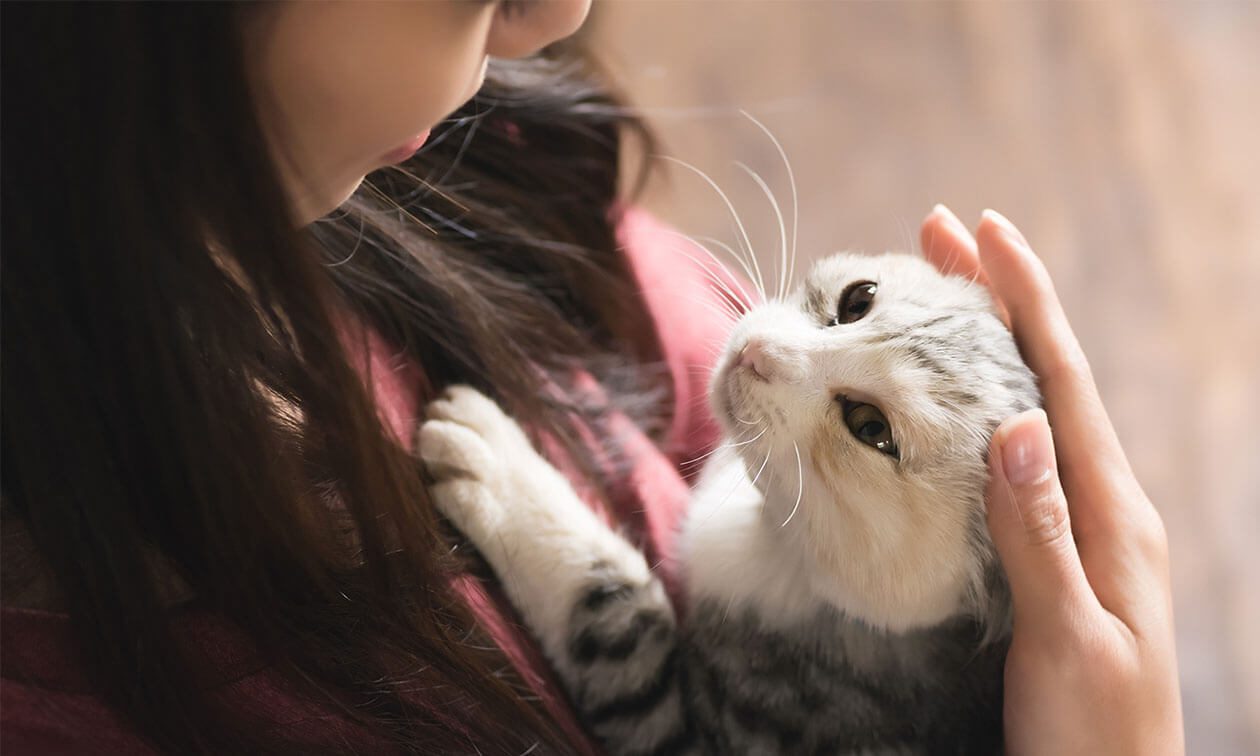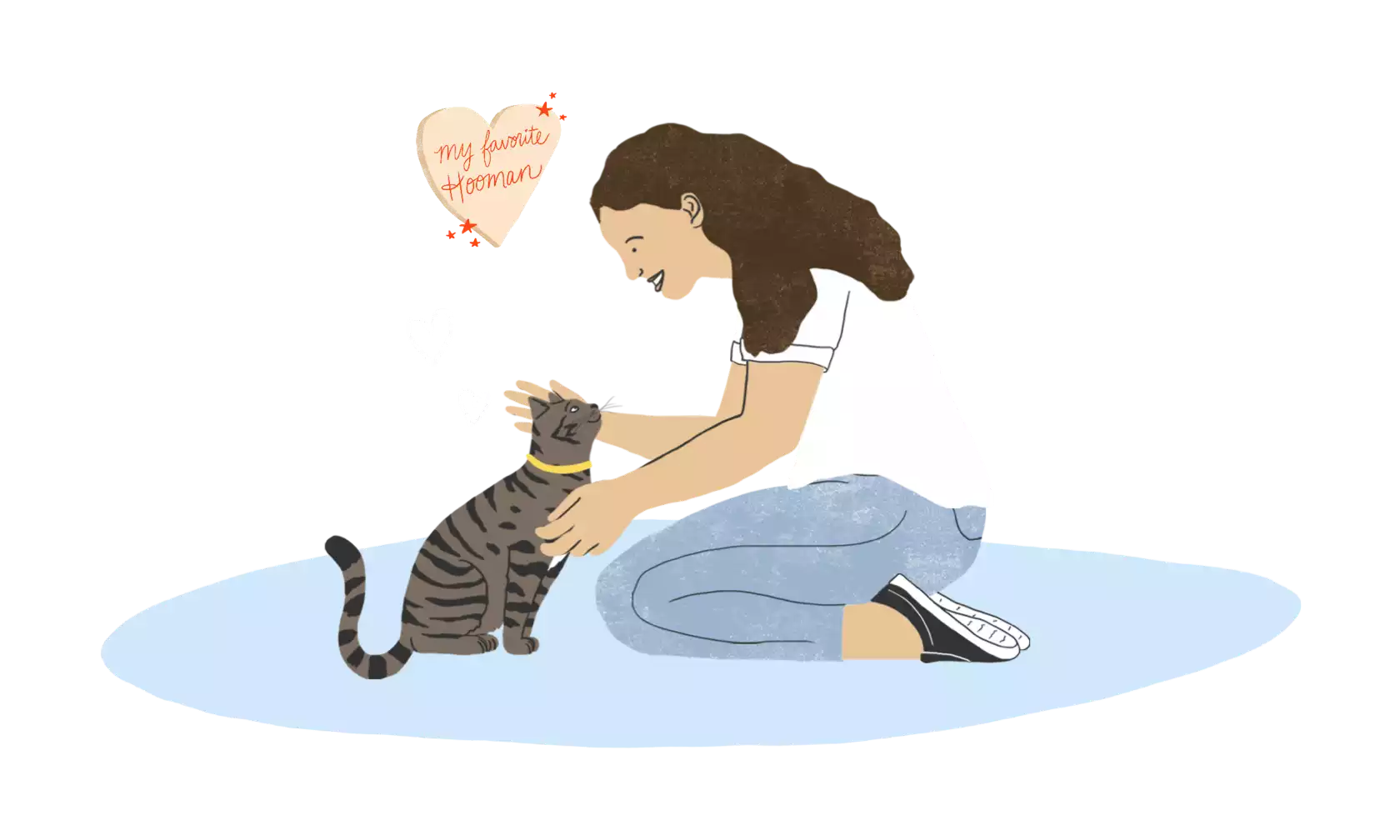If your cat is attached to you like a climbing vine wrapped around a fence, you may have a clingy cat (also known as a Velcro or needy cat). In some situations, this behavior is just fine — it can be a real ego boost when our cats don't want to be without us. Clinginess can be problematic if it's too intense, your cat gets stressed when you're not nearby, or it's interfering with your day.
Characteristics of a Clingy Cat
The degree and frequency of clinginess can vary. The clingier, the more the behavior may be something to worry about. Cats are individuals, and some are naturally happier near their people. Cats who are a bit more anxious may feel safer with their human nearby. That doesn't necessarily mean you (or your cat) have a problem. If your cat seems genuinely stressed when you're not nearby (or they obsessively make sure to stay close) it's time to pay attention. Here are some common signs that your kitty may be breaking the threshold of average clinginess and heading into the "overly clingy" zone:
- They become your shadow. Your cat follows you around everywhere you go. When you move, they move. Sometimes their proximity to your feet as you walk may even trip you up.
- They insist on always sitting or lying on you or near you. Whenever you sit or lie down, your cat joins you, uninvited, and will plop down either directly on you or right next to you.
- They're excessively vocalizing, rubbing against you, or using unwanted behavior to get your attention. Often, stressed or bored cats will meow continuously or rub against you until they get what they want — your attention. Or your cat may do things you don't want them doing, like scratching furniture or knocking things off a shelf, because that behavior has gotten your attention in the past.
- Your cat demands to be in the same room as you. If you're in a room and the door is shut, preventing your kitty access, they will meow loudly and scratch at the door until they are allowed in.
- They're distracting you when your attention is focused elsewhere. This is often accomplished by using their body as a diversionary tactic, sitting or lying down on the object you're using, like taking over the keyboard of your laptop while you're trying to type.
- A cat refusing to eat or drink unless you're nearby. Although this is uncommon, some needy cats will not eat or drink unless their person is close.
One or two of these happening occasionally isn't uncommon, especially if your cat is bored. But if you see many or all these behaviors regularly, your cat may be dealing with considerable boredom, anxiety, or medical issues causing their clinginess.
Can Clingy Cat Behavior be a Medical Issue?
Although behavioral issues are often blamed for clingy behavior, medical issues must be considered, especially if it is a new or sudden behavior. Even minor impacts on a cat's health can trigger behavioral changes. When cats feel ill, they can become clingier. This is especially true for an older cat. If they start not feeling well, having vision or mental state issues, they will become more insecure.
If you notice an increase in attention-seeking behavior like clinginess, schedule an appointment with your veterinarian to rule out possible medical issues. They will likely perform a physical exam and lab tests to evaluate your cat's health status.
Why is My Cat Suddenly So Attached to Me?
As discussed above, medical problems must be ruled out first as this is a common cause of cat behavior change. If they're cleared medically, some other common causes of clinginess include:
- Changes in the environment. A new family member, such as a baby or another pet, may mean that your cat now has some competition for your affection. This can cause some cats to become anxious and/or more demanding of your attention.
- Changes in the schedule. For example, transitioning from a home to a work office may throw your kitty for a loop, causing them to be clingier since you're away for longer periods. Also, if you have been traveling and leaving your cat with a sitter, they may want to be around you more.
- Decrease in the amount of attention. Maybe there haven't been changes in the environment or schedule, but you are not spending as much time with your cat for whatever reason. Their increase in clinginess may be just their way of saying they want you back.
- Boredom. Cats aren't meant to sleep all day. If your cat doesn't have things to keep them entertained and challenged, or you're their primary source of activity, they're likely to be clingier to try and get that engagement from you.
Managing Clingy Behavior From Your Cat
Although we love the cuddliness of our feline friends, there are times when work needs to be done, and our attention must be focused on other things. If stress or boredom plays a role, we want to address those issues. With a sprinkle of persistence, a dose of patience (okay, perhaps a hefty dose), and the right techniques, the attention-seeking clinginess of your cat can be overcome. Once your cat has been cleared of potential medical causes:
- Ignore undesirable behavior. This will be tough, but it's the most important step in correcting attention-seeking behavior. When your cat displays undesirable behavior (e.g., excessive meowing, following you around, scratching at the door, etc.), give them no eye contact, verbal contact, or physical contact. Simply leave the area or, if the cat needs to be removed, do so quickly and without extended interaction. In the beginning, there may be an "extinction burst." This means that the cat will be more persistent for a while because their actions worked in the past, so they try harder. Power through this stage, and they should soon learn that this behavior isn't getting them anything.
- Avoid physical punishment. Your cat will interpret punishment as attention, so it may reinforce unwanted behavior. More importantly, physical punishment can cause fear or aggression and can damage your relationship. It just does not work.
- Catch your cat doing something right. Reward your cat when they're calm and relaxed. For example, if you can catch a moment when your cat is mellow during times when they'd usually follow you around or vocalize, give them praise, a light scratch behind the ears, and a food treat. This reinforces the behavior that you want.
- Have a consistent daily schedule. A set schedule can help lower a cat's stress, anxiety, and attention-seeking behaviors. Feed your cat at about the same time every day. Conduct play sessions when you first get home from work when your cat is even more hungry for your attention. If possible, leave for work and come home around the same time each day.
- Provide environmental enrichment. Providing more physical and mental stimulation will help cats with attention-seeking behavior, especially if they're bored. It also reduces stress and anxiety. Make treat time into a treasure hunt by hiding food treats around the house. Use food puzzles for dispensing your cat's meals. Provide a cat tree that gives a panoramic view of your backyard. Offer toys that encourage self-directed play and have interactive play sessions. Be innovative and creative!
If these tips don't help reduce your cat's clinginess, consider working with a certified feline training and behavior specialist. Your kitty may be dealing with more serious stress or anxiety that needs special attention, or there may be a particular trigger you can identify and remove.
ZPC-02519



